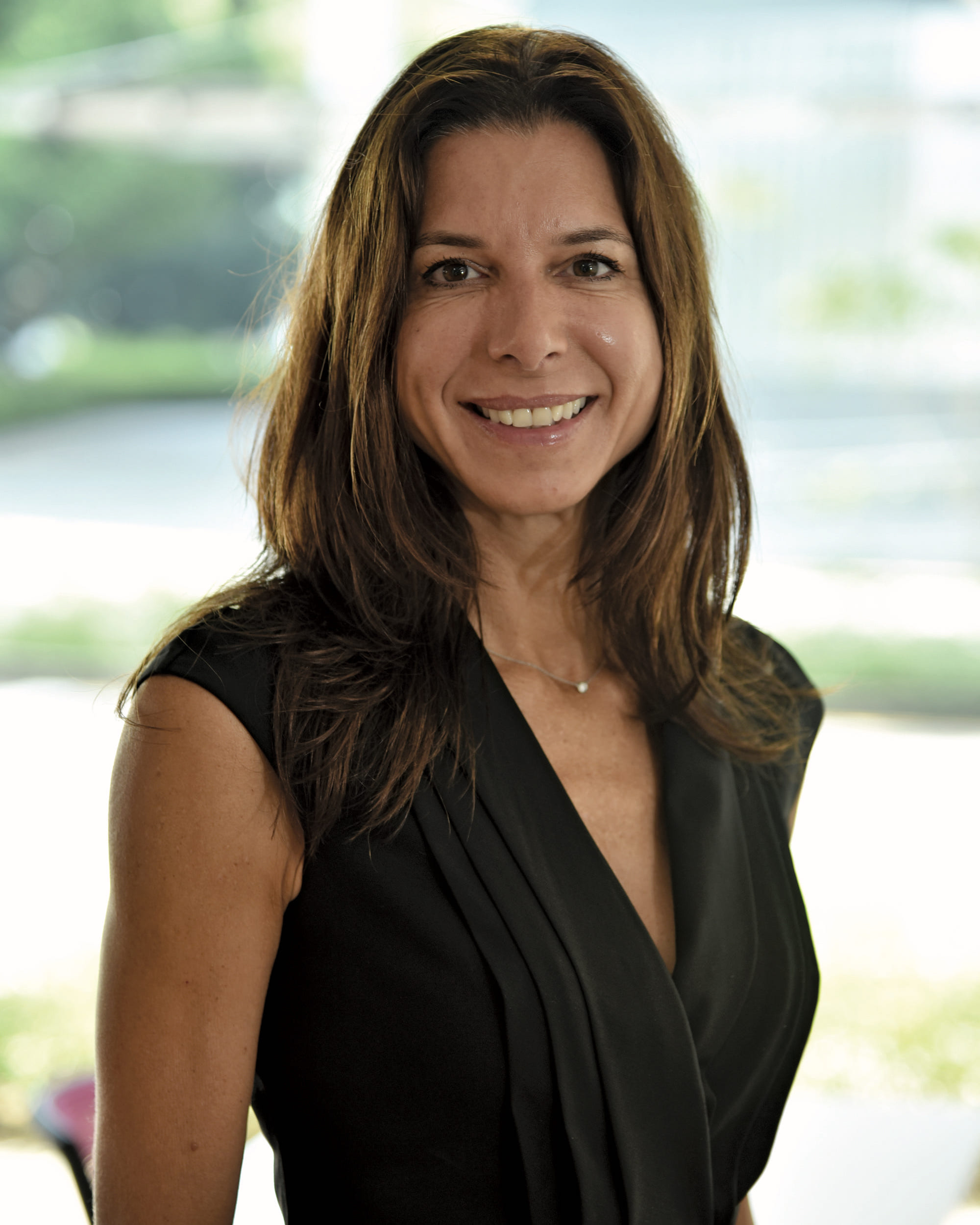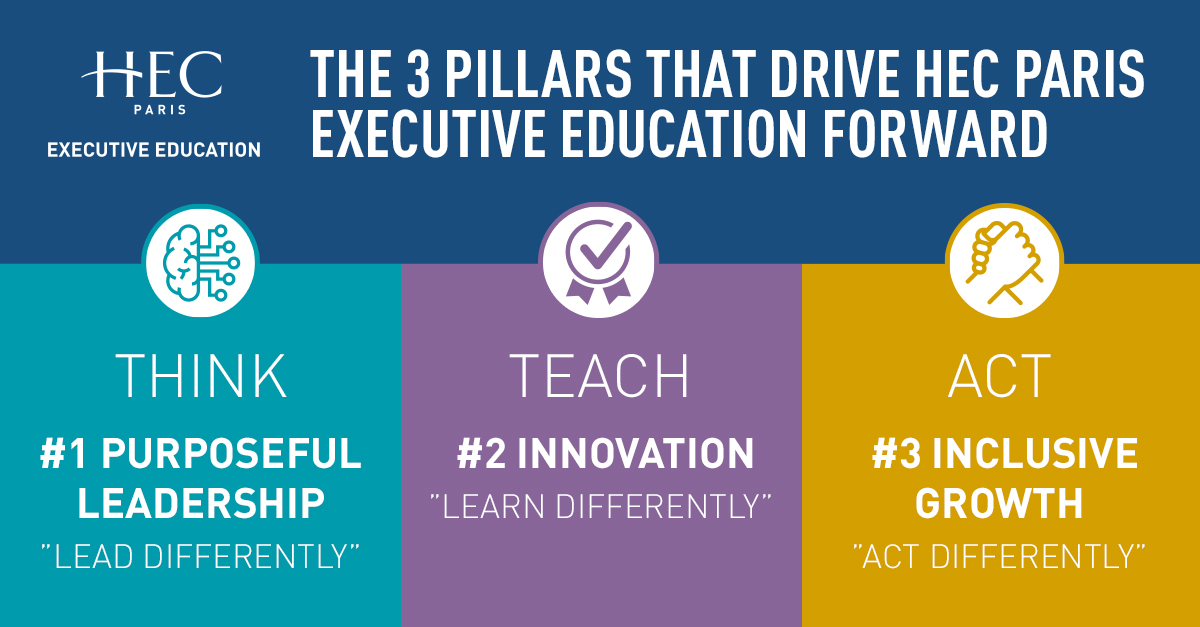Innovation, Purposeful Leadership and Inclusive Growth - The Three Pillars that Drive us Forward
Interview with Anne-Valérie CORBOZ, Associate Dean HEC Paris Executive Education

What was the reasoning behind the three pillars?
Every business needs an identity, a reason to believe. A question I would constantly ask the HEC Paris Executive Education team was “What is our identity? Why do we get up in the morning? and what do we find exciting about being at HEC Paris?”. In parallel, when clients ask - “Why would I partner with you? How are you different from other business schools?” we need a clear, compelling answer.
The reality is that these three pillars inscribe themselves in something that was already there but maybe not crystallized. France is a country known for innovation (across disciplines and time). It has a strong history of inclusive growth and purposeful leadership (think ‘époque des lumières’, humanists etc.). The same goes for our school - we walk our talk in terms of having a positive impact on society. That means innovative solutions, purpose driven leadership and inclusive growth. We have a role to play in society, and we do it to the best of our ability.
What is your perception of innovation in our context?
The reason why I talk about innovation internally at HEC Paris is that we have a truly impressive innovation ecosystem, including centers such as Innovation and Entrepreneurship, Hi! Paris and Station F . We run incubator and excubator programs, bootcamps and mentor start-ups. We design creative learning journeys and new pedagogical approaches. We are doing a lot of things in very innovative ways and we need to capitalize on these more.
But it is equally important to focus on how we innovate internally. For that to happen we need to encourage experimentation (and the failures that go with experimentation). If we don’t try, we won’t know. If you do something innovative, let’s find an outlet to express it, and let’s push ourselves forward. I want to encourage that innovation DNA - so let’s experiment, let’s innovate, let’s step out of our job description or out of our boundaries if we think it makes sense. Let’s take risks.
In addition, the market has become increasingly competitive, with new entrants that are not “classical” business schools – the googles and apple of this world, consulting firms, digital players. How do we differentiate ourselves? We can no longer rely on waiting for business to come to us, we must pursue business. In innovation lies a shift in mindset.

Anne Valérie Corboz
Are we talking about disruptive or incremental innovation?
“Let’s be disruptive” has become the hallmark of innovation but in reality, most innovation is incremental. Disruptive innovation tends to be what happens to you, not what you make happen. We want to be the stewards of our innovation process.
In our context, it’s about process improvements, it’s about each of us in our jobs saying - “how could I do it differently, and a little bit better?” We’re talking about small steps but the sum of all those parts results in significant change.
Do you think we are credible externally in terms innovation?
Absolutely. We have partnerships and centers such as Hi! Paris and Innovation and Entrepreneurship. We have some world-renowned faculty who are researching, publishing, and teaching on innovation and associated fields. The onus is on us to communicate that research and share our thought leadership around the topic of innovation and innovative pedagogy.
We need to be constantly asking ourselves: What have we done that is truly innovative? What have we done in terms of program design for the companies we work with? What have we done in terms of learning journeys for participants that was truly innovative?
What is your perception of purposeful leadership in our context?
Purposeful leadership is an important pillar for me: What’s our ‘raison d’être’? What’s our sense of purpose? We are in such a privileged industry, where we have the potential to have impact in an extremely positive way.
We should lead with purpose internally. I’m actually looking at incentives that would drive a purposeful style of leadership. I’d like to have a culture that’s built on trust, agility and autonomy. A culture where we know our purpose.
Purposeful leadership is also intricately associated with client centricity. We need to remember that we are all working in the educational dimension of the service industry. We are not a hotel, we don’t do ‘edutainment’ - we provide learning journeys that serve the learning needs of our clients. We have a social responsibility towards our clients and towards society, and that responsibility should be reflected in our leadership style.
When I started teaching, I wanted to have an impact on all the students in my class. I wanted everyone to come out a better entrepreneur, or a better strategist. With time, I realized that if I could change just one person in that class, who could have a positive impact on society, then I’d done a good job. If each one of us in our teams can help one person grow, and go on to better and greater things, even if it means losing them, then we are moving in the right direction. That is how I see purposeful leadership.
How can we demonstrate that purposeful leadership and inclusive growth drive us forward?
There are strong examples of this at the school, including the work done by the Society & Organizations Institute. We have been working on CSR and on social impact for much longer than most business schools, and our impact is meaningful, as highlighted recently by the AACSB. If you look of at the history of HEC Paris, this dimension of purposeful leadership and inclusive growth have always been there.
We also work extensively with SME’s, we support regional development, collaborate with the FNE to support the upskilling of those impacted by the economic crisis and help women entrepreneurs succeed with our Standup program. Our clients are not all Paris based or global multinationals.
Participants come from across the country to get an HEC Paris education. We are constantly thinking about how to finance people’s education, and I haven’t seen that in other business schools. The effort we put into helping our participants find financing is really quite significant.
We’ve also operated for a long time in countries where few have operated in the past. Countries like the Ivory Coast and Morocco, where we support multiple educational initiatives. Where possible we have tried to adopt different pricing models or worked with agencies such as the ‘Agence Française du Développement’ to fund students and offer grants. We have walked our talk in how we support education across the board.
How can we ensure that these three pillars influence how we act and move forward?
There are both symbolic and concrete dimensions that we need to work on. In the end, actions speak louder words.
Let’s take inclusive growth as an example. Are we hiring anyone who is differently abled? Are we helping people grow? Are we rewarding purposeful leadership and inclusive actions within teams? In terms of innovation, how do we encourage people to participate in process improvement, share their ideas? Should we have innovation awards? Fuji, for example, implemented this approach when they strove to become more innovative. The conservative Japanese CEO unexpectedly took the stance of “Blow up the lab in Tokyo if you want to, just do something different”.
I don’t have all the answers yet, but I hope that if I’m demonstrating and encouraging certain behaviors that embody the three pillars, it will create a positive virtuous circle.
